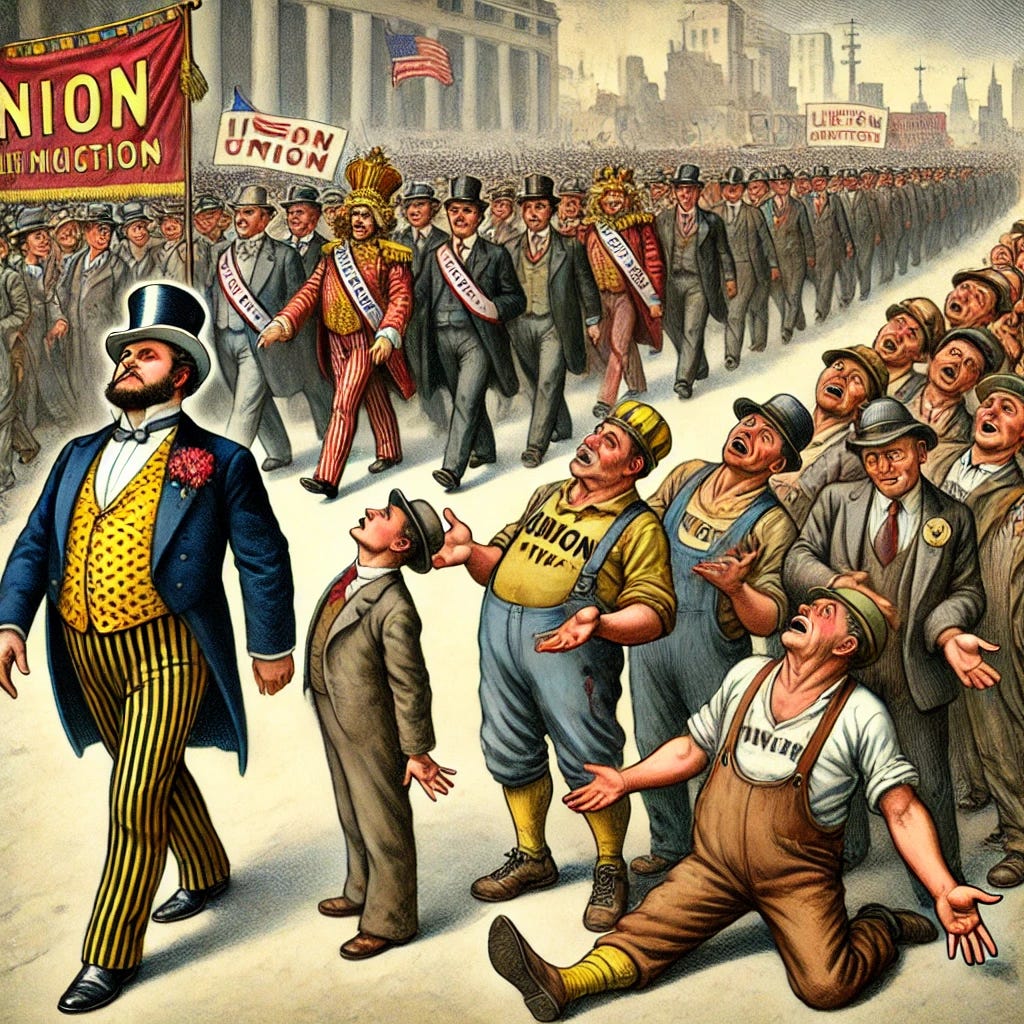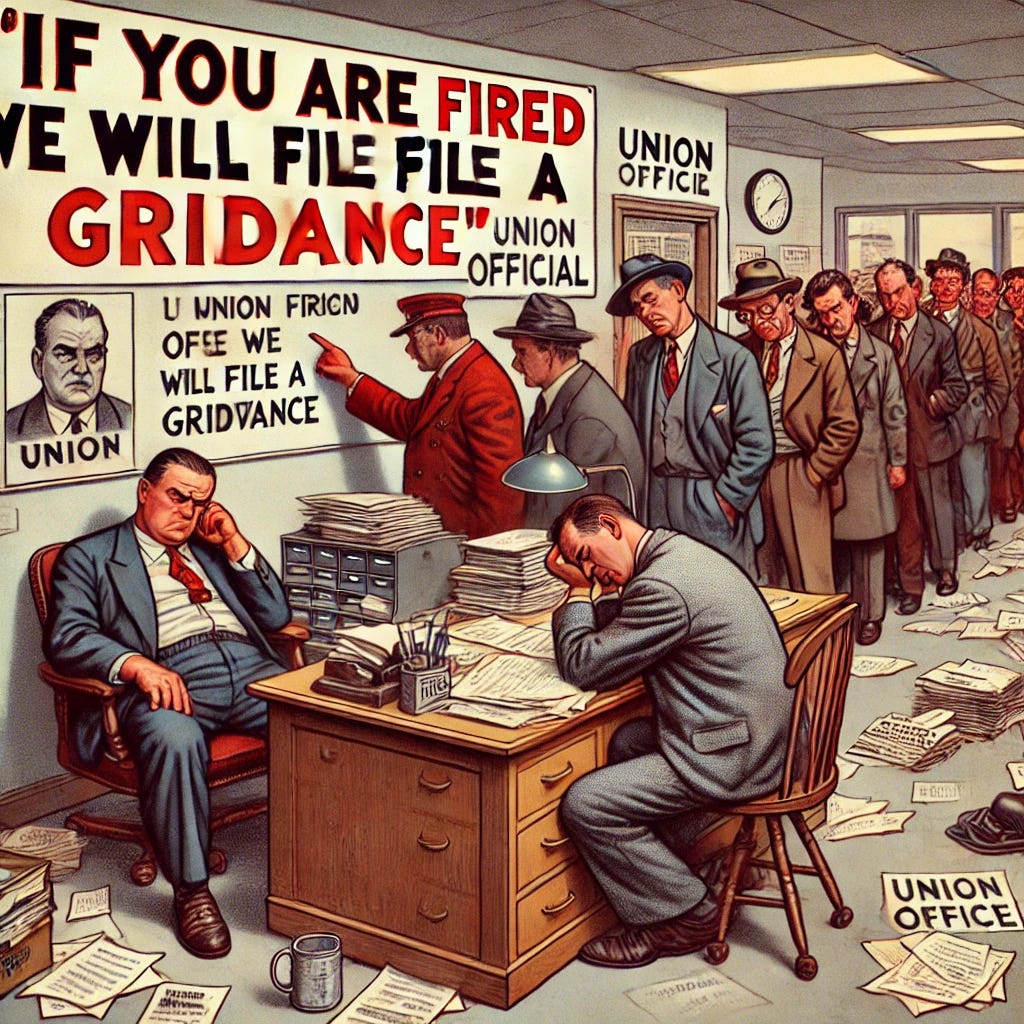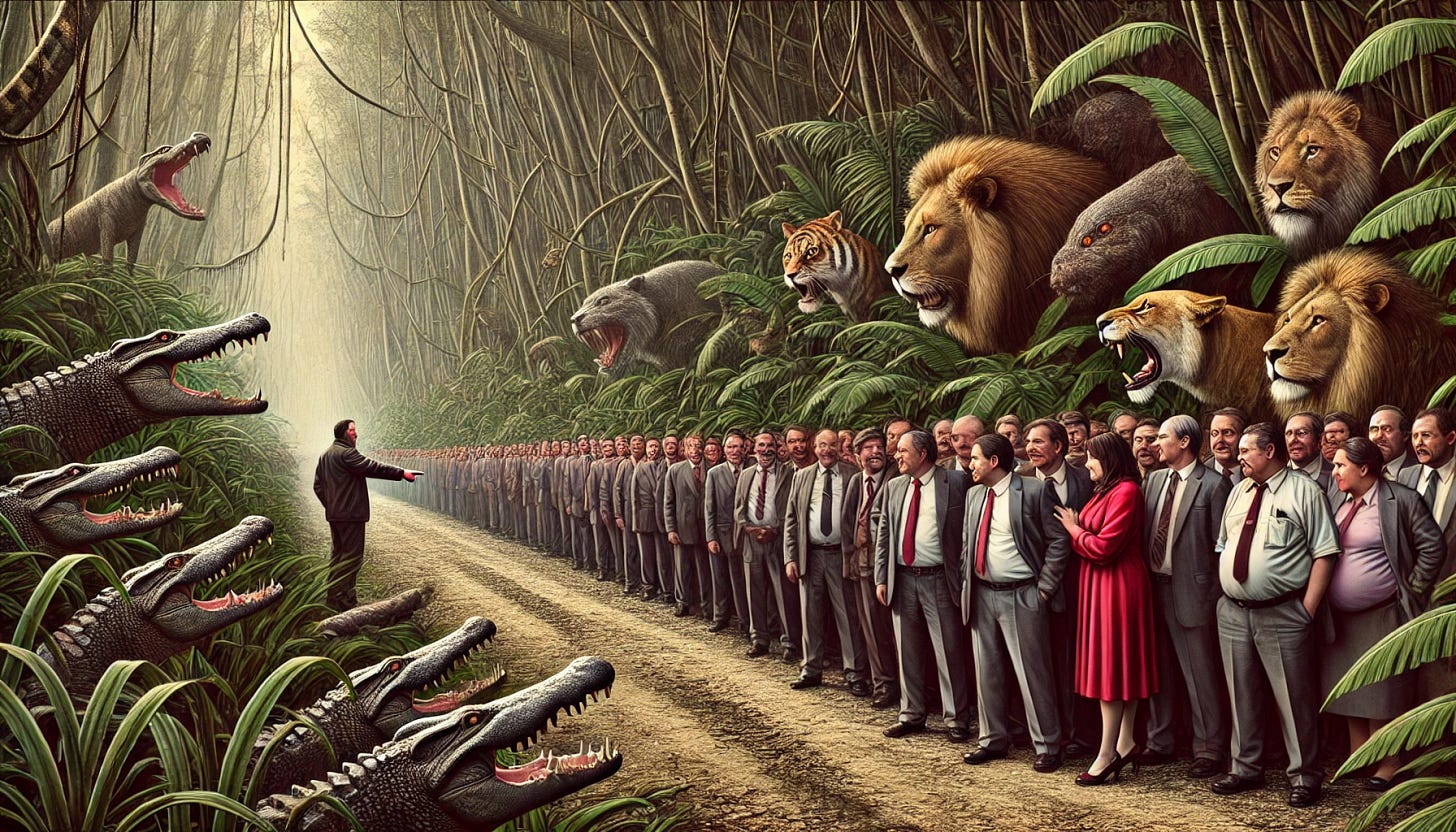WHAT HAPPENED TO UNIONS?
Helping And caring about members? No time, they’ve got to weigh in on Israel (and other socialist/leftist causes du jour)
If you believe in the importance of free speech, subscribe to support uncensored, fearless writing—the more people who pay, the more time I can devote to this. Free speech matters. I am a university professor suspended because of a free speech issue, so I am not speaking from the bleachers. The button below takes you to that story if you like.
Please subscribe and get at least three pieces /essays per week with open comments. It’s $5 per month and less than $USD 4. I know everyone says hey, it’s just a cup of coffee (with me, not per day but just one per month), but if you’re like me, you go, “Hey, I only want so many cups of coffee!” I get it. I don’t subscribe to many here because I can’t afford it.
But I only ask that when you choose your coffee, please choose mine. Cheers.
_______________________________________________
As a child, I read The Jungle by Upton Sinclair. It told of deplorable conditions in Chicago meat packing plants and how unions were needed to protect the working man. Growing up in Winnipeg, I knew about the Winnipeg General Strike in 1919. While my ancestors were not unionised, they were farmers going back hundreds of years in Ireland. I did not come from a background of manicured nails; my summers were spent doing heavy manual labour, shovels, hammers, moving tyres on top of tarps of cattle feed, with the trapped tyre water full of mould, tossing bails of hay that occasionally had a dead rat on the back side; my history was dirty nails and callouses. I was not some bourgeois, anti-union capitalist lackey.
My father told me that one spring on the farm, they had no money for seeds and had to borrow from relatives. While not impoverished by the standards of the 1970s in Winnipeg, by today’s standards, we would not have been well off. My working-class bona vides were certainly as strong or stronger than any of the union leftists that were mandated to represent me.
Like everyone else at my university, I was cobbling together a teaching/lecturer career, and the faculty was well over 90% sessional; I taught 20 courses a year, and I had to pay two sets of dues to OPSEU and CUPE. Like most faculty, I ignored the unions; they ignored us, perhaps the occasional invitation to a meeting that nobody attended, but they were simply a payroll deduction.
But suddenly, without any run-up or explanation, I was suspended without charges, banned from campus, and banned from communicating with anyone associated with the university (the logic of banning someone while keeping witnesses anonymous still escapes me). When I went to meet the union, management had a security guard trail me. The office was closed, and management filed a trespass order on me and threatened me with police arrest and a $10,000 fine - belts and suspenders, I guess.
But there were no union objections and nothing to see here. A month later, I discovered via a human rights complaint that I had offended an unknown Palestinian professor (who taught one course per year). I had told a stranger in another land that I stood with Israel, and if you stood with Hamas, you stood with Nazis; unfortunately, the LinkedIN algorithm spit my response to a TikTok-educated student, and he had been eager to foment trouble, not stopping with my post, but inventing various defamations that he and others, including senior management and faculty, spread throughout the university. He ran to the aforementioned unknown professor. I discovered quickly that this professor was friends with and politically aligned with our vice provost. The VP pushed him off the signature line of the human rights claim. She was the top administrator in the university and wanted to make sure that I was aware that the judge of all academic staff was also my chief tormenter. However, the union did not see that as a conflict of interest, even though a tent pole could have called that one.
I still needed union support, though. They were my only legal representation, and lawyering up was not a meaningful option.
Neither union suggested meeting or talking on the phone, and they resented questions. The university had lawyers and public safety officers threatening me. Still, the union was silent, implicitly suggesting what they had told students in the 1950s to do in case of a nuclear attack—hide under their desks.
I expected the union would be indignant about this blatant political suspension, but they were blase at best. CUPE filed one grievance, but they said it was rejected, and with questions about the status never unanswered, I gave up asking. For eleven months, I have tried to spur them to listen, care, and take action, but they consider my questions harassment; the strategy they finally said was, “If you are fired, we will grieve it, shut up and go away.”
I threatened them with a bad-faith filing but discovered that that was like banging on the side of a honeycomb before collecting the honey; it just made them worse. It was not that relations went from good to bad; they went from disinterested to angry; they refused to file grievances, didn’t show up for meetings and went months without meaningful communication other than to scold me about my bad attitude.
I was my union, except without union rights, just all the work; I read human rights policies, precedents and collective agreements and then spoon-fed them to the union, but they simply ignored it.
I tried to tell the unions the grand narrative, but they never were interested. I was their problem child, passed from one rep to another, with the only consistent factor being that no one ever read more than a hundred words of what I wrote or had any interest in the big picture. Both refused to meet or speak on the phone; they were always at conferences, union events, or vacationing.
(I can’t get AI to spell)
I felt they owed me, but even though tens of thousands in dues had been deducted from my pay, they believed any effort was an unwarranted favour.
While I was slandered and attacked, they never offered a kind word. Never “we’ve got your back, we’re with you,” - more “Stop bothering us. Go away.” Although WSIB approved a claim of PTSD because of the abuse and defamation orchestrated by the university staff, admin and faculty, the union said that did not merit a grievance of harassment. I had to go to the union site to cut and paste the rules that allowed me to force a grievance and inspire them to act.
The old saying about ‘with friends like this who need enemies’ seemed apt.
The simple fact was that a man named Fred Hahn was the head of CUPE, and he was on the record of hating Jews and being pro-Hamas, and OPSEU were of the same political ilk. So, realistically, the unions were ideologically on the side of my accusers and management. That was not debatable.
They said it didn’t matter, and such conflicts of interest didn’t affect them, but I was never sure. If conflicts of interest were not a thing, why were they banned in civil and criminal law?
Unions should have to open their books and not be allowed to contribute to political causes. How does the Jewish member or Jewish supporting member feel when they know their union has officially said they are utterly opposed to the state of Israel? Of course, the members feel that the union will not support them.
My union local of OPSEU has refused to file a grievance on my behalf (though I am allowed to push one through under individual carriage rights), and they are breaking their rules by refusing me. But little can be done. I can rant and rave and get called a bad apple, but they have the power; they control the machinery.
But I should believe it has nothing to do with the fact they are utterly on the same page as my accusor on a case 100% focused on free speech, Hamas and Israel. Sure. Nudge. Nudge. Wink. I can lose and get no representation, but do I have to repeat what is obvious bull shit? I will not. Thank you, Substack :)
Does the union have to start posting translations of Hitler’s best speeches before I am allowed to say their anti-Semitism is the reason they are denying me representation? Actually, yes, it seems that is the case.
And what does this do at a macro level? Any political statements by unions automatically create self-censorship amongst members. Members rationally reason that they best keep silent, for if they ever need union help, they don’t want to be denied support. Of course, the union will always say their profound biases do not affect their members’ support.
Why would unions say otherwise? They are stupid, but they could be lying or self-deluded and have profoundly low emotional intelligence.
I realise all locals are different, but imagine if you hired a lawyer who either didn’t care if you won your case or secretly hoped you’d lose. You would toss them instantly, but you can’t toss a union.
I saw management lying and obfuscating. A month before I was given human rights charges, on the day of the initial suspension, university management boasted to staff and faculty that no matter what, I would be terminated; any pretensions of due process were false. Management was behaving like schoolyard thugs. The union was too afraid of them or too torn between their political alliances to act.
So, I had to live with the perpetual stress that, based on the evidence, my union perhaps did not want the best for me.
Violations of the collective agreements and the human rights code piled up, but the unions missed all those gapping four-lane turnoffs and drove on, whistling to the La Marseillaise.
I thought unions were about workers. However, in the same way that “free markets” tend to stray from being about “freedom,” modern unions seem to have taken a sharp turn away from their original mission of worker advocacy. Today, they often look more like political operations masquerading as labour organisations. So, what happened?
Unions started as a reaction to miserable working conditions. Back when “benefits” meant you came home with all your limbs, a 60-hour workweek was the norm. Organising gave workers leverage—collective bargaining power. The aim was to negotiate better wages, benefits, and working conditions. And for a good while, it worked. We can thank unions for the 8-hour workday, weekends, health benefits, and safety regulations.
But here’s the thing about power: it corrupts. Over time, unions grew more bureaucratic and drifted from their original mission.
Fast forward to today, and you’ll notice that many union leaders have forgotten who they’re supposed to represent. Instead of championing the interests of their members—the very people paying their salaries—they’ve drifted into the world of political activism. And not just any kind of activism, mind you, but a decidedly left-wing brand that doesn’t always align with the values or needs of their rank-and-file members.
Perhaps the most serious issue is that many unions seem to be doing just enough to avoid accusations of bad-faith bargaining but not enough to represent their members effectively. Others have called it the “minimum effort syndrome.”
Here’s how it works: the union leadership knows they’re supposed to represent the workers, but they also know they can’t completely ignore their responsibilities without risking legal trouble. So, they go through the motions. Sure, they might attend a few meetings, file the occasional grievance, or sign off on a watered-down contract—but they are like a teenager with a bad attitude raking the backyard; their heart is not in it.
Why? Because rocking the boat would require effort. More than that, it might put them in a position to go against their political alliances or step outside their cosy relationship with certain policymakers or executives. You see, it’s much easier to sit back, collect dues, and occasionally make a statement about social justice issues than to do the hard work of labour organising.
So, how did unions morph from worker advocates into political players? It didn’t happen overnight, but you can blame some of it on the natural entanglement between politics and labour. Labour issues, after all, often require political solutions. However, the problem is that, over time, union leadership started to see themselves less as negotiators for better pay and working conditions and more as crusaders for a wide range of progressive social causes.
There’s nothing inherently wrong with unions taking positions on social or political issues. But when those positions overshadow their core mission, we’ve got a problem. These days, you’re just as likely to hear a union spokesperson talking about climate change or immigration policy as you are about wage negotiations. Again, all fine issues in their own right, but if you’re a union member whose primary concern is whether or not you can keep the lights on at home, you might feel a little left out.
My employer doesn’t care if I can pay my mortgage or pay for therapy that was necessitated by management abuse. They are playing with house money and don’t have skin in the game, but you’d never know it by their savagery. Unions must be there to push back; in many cases, though, they are AWOL.
Worse still, unions have become so politically aligned with the left that they risk alienating a significant portion of their membership who may not share those same ideological views. Remember, union members come from all walks of life and don’t vote the same way. When unions become little more than an arm of a political party, they stop being effective representatives for their full membership. When your legal representative supports the main accusor’s position, they are in a conflict of interest. Crazy talk, some people say, but quite obvious to anyone but professional gas lighters.
A New Code of Conduct for Unions?
Given the current situation, unions should be forced to adopt a new code of conduct that ensures they do their jobs and represent all their members, not just those who agree with them politically. So, what might this code of conduct look like?
1. Prioritize Member Needs Over Political Agendas: First and foremost, unions need to remember that their primary job is to advocate for their members’ wages, benefits, and working conditions. Everything else should be secondary. If a union is more focused on electing progressive candidates than negotiating fair contracts, it’s lost its way. The union should not be taking political sides.
2. Transparency in Decision-Making: Members should clearly understand how their dues are spent. If the union is funnelling money into political campaigns, that should be disclosed, and members should have a say in whether that’s where their money goes.
3. Accountability for Grievances: Unions must be held accountable when they refuse to file legitimate grievances or ignore their members. There must be a fixed communication process; meetings must be held in person if the member wants, and defined duties must be recorded and signed off on by the union and member. There should be tick sheets, and the union's service must be explicit and verifiable. There should be an independent body that workers can appeal to if they feel their union isn’t representing them properly. The union head office is useless. I complained to them, and OPSEU violated my privacy and sent the complaint to the person I complained about. She had a hissy fit and withdrew two of my grievances, violating the collective agreement and acting like a vindictive 12-year-old—a complete violation of the union contract. There is absolutely nothing I can do when there is this level of corruption. It needs to change.
4. Nonpartisan Representation: Unions should strive to be nonpartisan in their representation. While labour issues often intersect with politics, unions must ensure they represent all their members, not just those who share their political views.
Either we stop unions from acting like the political arm of the NDP or the extreme left of the Democratic party or create regulations and rules allowing union members to receive alternative and non-partisan representation at union expense when there is a conflict of interest.
You cannot have a union like CUPE or OPSEU, where they have declared their hatred of Zionism and Israel, representing a professor or member who has been suspended because of their stand on supporting Israel and their opposition to those who seek its destruction.
In my case, I should not have to be represented by an organisation that has publicly placed itself on the same team as my accusers.
You can’t depolitize a union, but you can create mechanisms that allow for fair representation. I recently analysed my case using clever software to see how it stood up against the collective agreements and the human rights code. The missed grievances and code violations were shocking; I should have had twenty grievances, but I had one or maybe two, and I still have no assurance that my union, because of their radical politics, are not actively supporting or working with management.
My livelihood, not to mention my blood pressure, has been gravely affected by an organisation that I am not allowed to opt out of, one that has taken tens of thousands of my earnings, won’t tell me how it is spent, and thinks that a “we refuse to meet or talk” is acceptable. Management is fully aware that the union is not pushing them, and they believe they have a licence to harass, obscure, attack and threaten with impunity. Management is not wrong.
Representation and expectations must be codified, minimum standards must be set, and accountability must go beyond the local and the union. Bad faith is an empty threat, with a failure rate of over 99%. Members should never be held to the whims and preferences of two groups of bullies, both the union and management.
Unions must operate in the best interest of all their members; they must stop acting like political parties; there must be protections for members that are, for all practical purposes, not represented, and there must be some mechanism for unionised workers to go to when their union will not help them.
Unions must go back to being about the workers; unions must be forced to represent members truly, not do the absolute minimum depending on their mood and political leanings. Today, it is a new jungle, but made up not of abused workers living in shacks full of rats; it is one of political bias, refusal to cooperate and an absence of accountability. The jungle may not be as dense, but the unions are busy planting trees and not concerned about clearing and levelling the land. Today, they are more of a problem than a solution.
Please subscribe and get at least three pieces /essays per week with open comments. It’s $5 per month and less than $USD 4. I know everyone says hey, it’s just a cup of coffee (with me, not per day but just one per month), but if you’re like me, you go, “Hey, I only want so many cups of coffee!” I get it. I don’t subscribe to many here because I can’t afford it.
But I only ask that when you choose your coffee, please choose mine. Cheers.
_______________________________________________









"For eleven months, I have tried to spur them to listen, care, and take action, but they consider my questions harassment; the strategy they finally said was, 'If you are fired, we will grieve it, shut up and go away.'"
Now I know why so many school boards "suspend teachers pending an investigation" -- if they fired the teacher outright, then the union would be forced to get involved, and neither the boards nor the unions want that -- it would mean less time at Pro-Hamas rallies. This way, the teacher/instructor is effectively eliminated and no one has to do anything; it's all perfectly anonymous and opaque, and there is no recourse.
Depressing. Do we need to form a meta-union whose job it is to convince the union to do its job of representing us?! Am I imagining it, or are our unions now the pigs at the dinner table in the gut-wrenching closing scene of Orwell's "Animal Farm"?